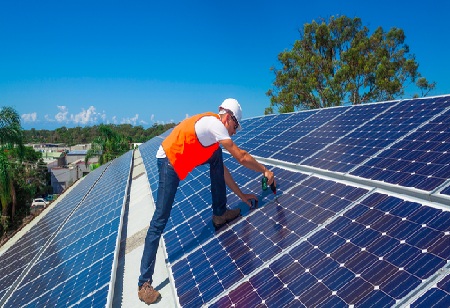At least 25 GW of solar power projects face delays or uncertainties due to an increase in module prices or supply constraints, according to industry officials. The cost pressures are significant for projects that quoted aggressive tariffs in Solar Energy Corp and GUVNL's 2020-21 auctions to win contracts. Subrahmanyam Pulipaka, CEO of the National Solar Energy Federation of India, said the tariff implication for these projects is Rs 0.5-0.8 per unit.
"These projects should have either been commissioned or in advanced stages of construction by now," said an industry official. "Since Basic Customs Duty (BCD) was not a pass through under change in law for these projects auctioned during 2020-21, they have become unviable and may not get implemented," the official added.
He noted that the gap between projects being awarded and implemented was widening. India imposed 40% BCD on the import of solar modules and 25% on import of cells, beginning April this year, to promote indigenous manufacturing. Solar
power developers have made several representations over the past 4-5 months to the government, seeking a two-year relaxation from higher import duties and mandatory equipment sourcing from a government-approved list of models and manufacturers.
They have also sought exemption of earlier bid projects from the new duty structure. A senior government official said the Centre was seized of the issues and the solar power industry's demands were under consideration.
Industry sources said only 58 GW of the targeted 100 GW capacity by 2022, under the National Solar Mission, was in place. The issue jeopardises the 450 GW renewable capacity addition targets, including 280 GW solar by 2030, they said. The country added 10 GW of solar capacity in 2021, while it needs to add close to 30 GW every year to be able to meet the target.
A nearly 40% increase in module prices due to strong demand post-Covid, bottlenecks in the supply of polysilicon, and an unprecedented surge in ocean freight charges and prices of commodities such as copper, silver, aluminium and steel have added to the cost.
The near 7% depreciation in the rupee's value this year and increased GST levy have further increased project costs. The Indian solar market is highly import-dependent, as over 90% of equipment is sourced from Chinese suppliers. The government has announced a Production-Linked Incentive scheme to encourage domestic manufacturing.
"Since modules typically form 60-70% of the entire solar project cost, this increase in prices have left many renewable projects exposed to huge losses and under-recovery -leading to delay in their implementation and may be cancellations too," said another industry official. Imported solar modules now cost about 40 cents per watt while domestic ones cost 37 cents per watt, against 27-28 cents for imported modules 18 months ago.
